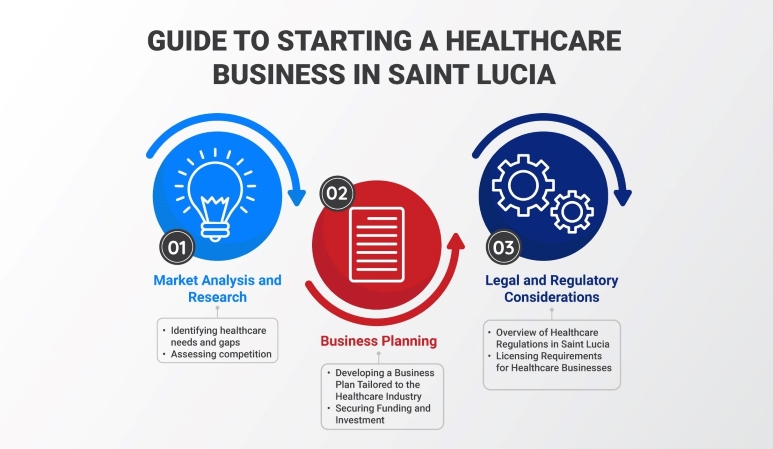- Notifications

We will only notify the newest and revelant news to you.
In this article, we provide a concise overview of the healthcare industry in Saint Lucia, emphasizing the critical importance of comprehending the local healthcare business landscape. Understanding the nuances of this sector is paramount for entrepreneurs and stakeholders alike. This article aims to shed light on key facets, challenges, and opportunities within the healthcare business in Saint Lucia, serving as a valuable resource for those seeking insight into this dynamic and vital industry.
At its essence, the health business is defined as a broad spectrum of activities dedicated to promoting, maintaining, and restoring health. It spans medical services, wellness initiatives, pharmaceuticals, and the intersection of technology and healthcare. The intricacies of health business involve the delicate balance between providing quality care, advancing medical innovation, and sustaining economically viable enterprises. In essence, it's about the convergence of health and commerce in a way that addresses the holistic well-being of individuals and communities.
In the picturesque landscapes of Saint Lucia, the significance of health business reverberates through the societal fabric. A robust healthcare sector is not only crucial for the health and wellness of the population but is also a cornerstone for socio-economic development. Beyond its humanitarian aspect, health business contributes significantly to employment, economic prosperity, and overall national progress. It catalyzes the nation's resilience and progress, fostering a healthy populace capable of actively participating in and contributing to the nation's growth.
The health business definition in Saint Lucia encompasses diverse sectors, each playing a unique role in the complex healthcare ecosystem. Healthcare providers, including hospitals, clinics, and private practices, form the frontline of patient care. Pharmaceutical companies contribute by developing and supplying medications, while medical equipment suppliers ensure access to cutting-edge technologies. Additionally, the wellness industry, health insurance providers, and healthcare technology companies play pivotal roles in shaping the multifaceted landscape of health business. Recognizing and comprehending these sectors is imperative for stakeholders seeking to navigate the intricacies of the health business in Saint Lucia. By understanding these diverse components, entrepreneurs, policymakers, and investors can foster targeted strategies that address the unique needs and challenges within the dynamic and evolving realm of health business in the region.

The health business is defined as a broad spectrum of activities dedicated to promoting, maintaining, and restoring health
The healthcare landscape in Saint Lucia reflects the nation's commitment to providing quality medical services and fostering well-being among its citizens. At its core, the current state of healthcare is characterized by a combination of strengths and challenges.
Saint Lucia's healthcare infrastructure is diverse, encompassing both public and private healthcare facilities. Public hospitals, clinics, and health centers form the backbone of the system, catering to the majority of the population. Private medical practices contribute additional specialized services, creating a collaborative environment.
Key healthcare indicators showcase the nation's dedication to health outcomes. Metrics such as life expectancy, infant mortality rates, and vaccination coverage highlight Saint Lucia's achievements in promoting public health. However, these indicators also serve as a roadmap for further enhancements, acknowledging the dynamic nature of the healthcare sector.
While the country has made commendable strides in healthcare, it grapples with challenges that necessitate strategic interventions.
One prominent challenge is ensuring equitable access to healthcare services, particularly in rural and underserved areas. Despite the efforts of the government, geographical disparities persist, limiting access for some segments of the population. Addressing this challenge involves optimizing existing healthcare infrastructure, deploying mobile clinics, and exploring telemedicine solutions to bridge gaps in service delivery.
The healthcare landscape in Saint Lucia presents exciting opportunities through the integration of emerging trends and technologies. Embracing digital health solutions, telehealth, and electronic medical records can enhance patient care, streamline processes, and improve overall efficiency. The adoption of technology not only facilitates better healthcare delivery but also aligns with global advancements in the field, positioning Saint Lucia as a player in the international healthcare arena.
Strategic partnerships with technology providers and educational institutions can drive innovation. Training healthcare professionals in the latest technologies ensures that the workforce is adept at utilizing modern tools, contributing to the sustainability and growth of the healthcare sector.

Exploring the Healthcare Landscape in Saint Lucia
Understanding the current state of healthcare in Saint Lucia requires an appreciation of its infrastructure, key indicators, challenges, and opportunities. By addressing existing challenges and leveraging emerging technologies, Saint Lucia can continue to advance its healthcare landscape, providing comprehensive and accessible services to its diverse population.
Embarking on the journey of starting a healthcare business in Saint Lucia begins with a meticulous market analysis and research phase. Understanding the unique healthcare needs and identifying existing gaps in services is crucial. This involves studying demographic trends, prevalent health issues, and community preferences. By recognizing the specific demands of the local population, entrepreneurs can tailor their services to address these needs effectively.
Assessing the competitive landscape is equally vital. Examining existing healthcare providers, both public and private, enables entrepreneurs to identify areas where innovation or specialization can distinguish their venture. This comprehensive market analysis serves as the foundation for strategic decision-making, helping entrepreneurs position their healthcare business effectively in the local market.
Developing a robust business plan tailored to the intricacies of the healthcare industry is the next critical step. This plan should encompass a detailed overview of the proposed healthcare services, the target demographic, and the unique value proposition that sets the business apart.
The business plan should outline the mission, vision, and goals of the healthcare business. It should also include an analysis of potential risks and mitigation strategies, a marketing plan, and details regarding staffing and operational requirements. A comprehensive business plan not only serves as a roadmap for the entrepreneur but is also crucial when seeking partnerships, investors, or loans.
Securing adequate funding is often a pivotal aspect of starting a healthcare business in Saint Lucia. Entrepreneurs can explore various avenues, including traditional loans, grants, private investments, or partnerships. Demonstrating a clear and well-researched business plan is instrumental in attracting potential investors or securing loans from financial institutions. Government grants or support programs aimed at fostering healthcare entrepreneurship may also be considered.
Navigating the legal and regulatory landscape is a critical aspect of starting a healthcare business in Saint Lucia.
Entrepreneurs must have a comprehensive understanding of the healthcare regulations in Saint Lucia, including guidelines for healthcare service providers, quality standards, and compliance requirements. This involves staying informed about updates or changes in healthcare policies to ensure the business operates within the legal framework.
Obtaining the necessary licenses is a non-negotiable step in starting a healthcare business. The licensing process typically involves submitting detailed documentation about the proposed services, facility standards, and the qualifications of the healthcare professionals involved. Compliance with regulatory standards ensures the delivery of safe and ethical healthcare services.

Guide to Starting a Healthcare Business in Saint Lucia
Starting a healthcare business in Saint Lucia requires a strategic approach that integrates market analysis, meticulous business planning, and adherence to legal and regulatory considerations. By addressing these key aspects, entrepreneurs can establish a foundation for a successful healthcare venture that not only meets the needs of the community but also contributes to the overall healthcare landscape of Saint Lucia.
Effectively managing healthcare business processes in Saint Lucia necessitates careful attention to operational considerations, ensuring seamless and efficient service delivery.
One of the critical operational aspects is staffing and workforce management. Ensuring the right mix of skilled healthcare professionals, from doctors and nurses to administrative staff, is essential for providing quality patient care. Strategies for recruitment, training, and retention play a pivotal role in building a competent and motivated healthcare team. Additionally, understanding and addressing staff needs contribute to a positive work environment, ultimately enhancing patient outcomes.
Efficient workforce management involves optimizing schedules, managing workloads, and incorporating innovative staffing models to respond to fluctuations in demand. By aligning staffing levels with patient needs, healthcare businesses can enhance productivity and maintain high standards of care.
The effective management of the healthcare supply chain is integral to ensuring a consistent and reliable flow of medical goods and services. This includes pharmaceuticals, medical equipment, and consumables. Healthcare businesses in Saint Lucia need to establish robust supply chain processes, from procurement to distribution, to minimize disruptions and maintain adequate inventory levels.
Strategic partnerships with reliable suppliers and the implementation of inventory management systems contribute to streamlining the supply chain. This not only ensures the availability of essential resources but also minimizes waste and optimizes costs.
In the contemporary healthcare landscape, the integration of technology is a transformative force, enhancing efficiency, accuracy, and patient outcomes.
Embracing cutting-edge healthcare technologies is vital for staying competitive and providing high-quality services. From diagnostic tools to treatment methodologies, healthcare businesses in Saint Lucia can benefit from adopting innovative technologies. This may include telehealth solutions for remote patient consultations, advanced imaging equipment for diagnostics, and robotics for precise surgeries.
By staying abreast of technological advancements, healthcare businesses can improve patient care, optimize processes, and differentiate themselves in the market. Moreover, technological integration contributes to the overall modernization of the healthcare sector in Saint Lucia, aligning it with global standards.
The implementation of electronic health records (EHR) is a cornerstone of efficient data management in healthcare businesses. EHR systems centralize patient information, facilitating secure and accessible data for healthcare professionals. This enhances coordination among different healthcare providers, reduces errors, and improves the overall quality of care.
Ensuring the security and privacy of patient data is paramount. Compliance with data protection regulations and the use of secure information systems contribute to building trust with patients and maintaining the integrity of healthcare records.

Optimizing Healthcare Business Processes in Saint Lucia
Optimizing healthcare business processes in Saint Lucia requires a dual focus on operational considerations and technological integration. By strategically managing staffing, supply chain, and logistics, healthcare businesses can lay the foundation for efficient service delivery. Simultaneously, embracing and integrating healthcare technologies, from advanced diagnostics to electronic health records, positions these businesses at the forefront of innovation, ultimately benefiting both the healthcare providers and the patients they serve.
Establishing a healthcare business in Saint Lucia requires a thorough understanding of the regulatory framework and a meticulous approach to obtaining the necessary licenses.
The application process for a healthcare business license in Saint Lucia is a structured and essential step. Entrepreneurs must compile a comprehensive set of documents, including details about the proposed services, facility specifications, and the qualifications of the healthcare professionals involved. The application typically involves a review by relevant regulatory authorities, ensuring that the proposed business aligns with established standards and guidelines.
Providing accurate and complete information is critical during the application process. This includes details about the organizational structure, staffing plans, financial projections, and other pertinent information required by regulatory bodies. Applicants may also need to demonstrate their commitment to quality care and patient safety through the incorporation of specific protocols and policies.
Compliance with regulatory standards is non-negotiable for healthcare businesses seeking licensure in Saint Lucia. These standards cover a spectrum of aspects, including healthcare service delivery, facility infrastructure, sanitation, and safety measures. The regulatory bodies may conduct inspections and audits to verify that the proposed healthcare business adheres to these standards.
Ensuring ongoing compliance is equally important. Healthcare businesses are often subject to periodic reviews and audits to assess their continued adherence to regulatory requirements. This emphasizes the need for robust internal processes and quality assurance mechanisms to maintain compliance over the long term.
Obtaining the proper healthcare business license in Saint Lucia is not just a legal requirement; it is a cornerstone in building trust and credibility within the community and the broader healthcare industry.
Proper licensing signals to patients, partners, and stakeholders that the healthcare business operates within established legal and ethical frameworks. It assures that the facility meets rigorous standards for quality, safety, and professionalism. This, in turn, fosters confidence among patients, encouraging them to seek services from a licensed healthcare provider.
Credibility is paramount in the healthcare sector, where the well-being and safety of individuals are at stake. A licensed healthcare business meets the regulatory benchmarks and demonstrates a commitment to delivering high-quality care. It enhances the reputation of the healthcare business, establishing it as a trustworthy and reliable entity in the eyes of the public.

Obtaining a Healthcare Business License in Saint Lucia is crucial
The process of obtaining a healthcare business license in Saint Lucia requires careful attention to the application process, compliance with regulatory standards, and an understanding of the broader significance of proper licensing. Beyond legal obligations, obtaining a license is a testament to a healthcare business's commitment to excellence, ensuring that it operates with integrity, credibility, and the highest standards of patient care.
In conclusion, this exploration of the healthcare business in Saint Lucia underscores the importance of understanding its landscape, challenges, and opportunities. Key takeaways include the significance of market analysis, adherence to regulatory standards, and technology integration. For entrepreneurs venturing into the healthcare sector in Saint Lucia, the encouragement is to approach challenges with innovation and dedication. As we conclude, the future of healthcare in the region holds promise, with ongoing advancements poised to shape a resilient and responsive healthcare ecosystem.
Latest news & insights from around the world brought to you by One IBC's experts
We are always proud of being an experienced Financial and Corporate Services provider in the international market. We provide the best and most competitive value to you as valued customers to transform your goals into a solution with a clear action plan. Our Solution, Your Success.